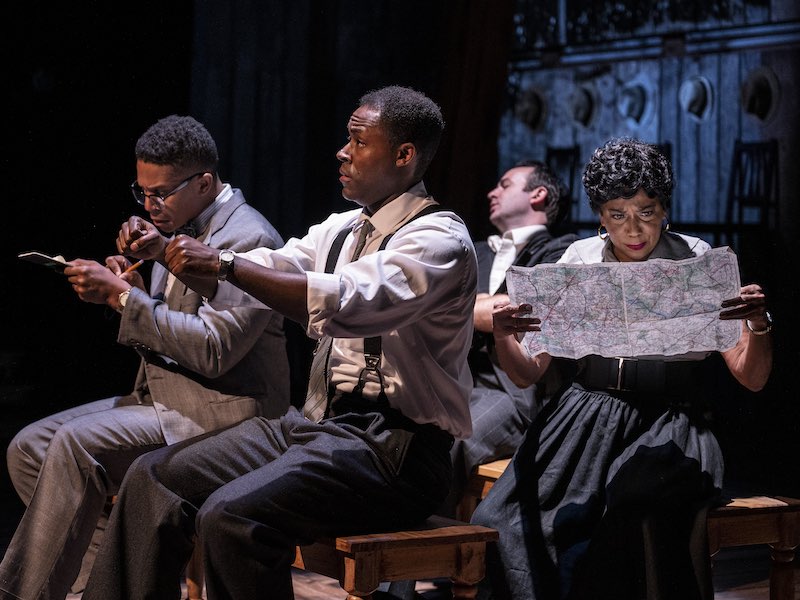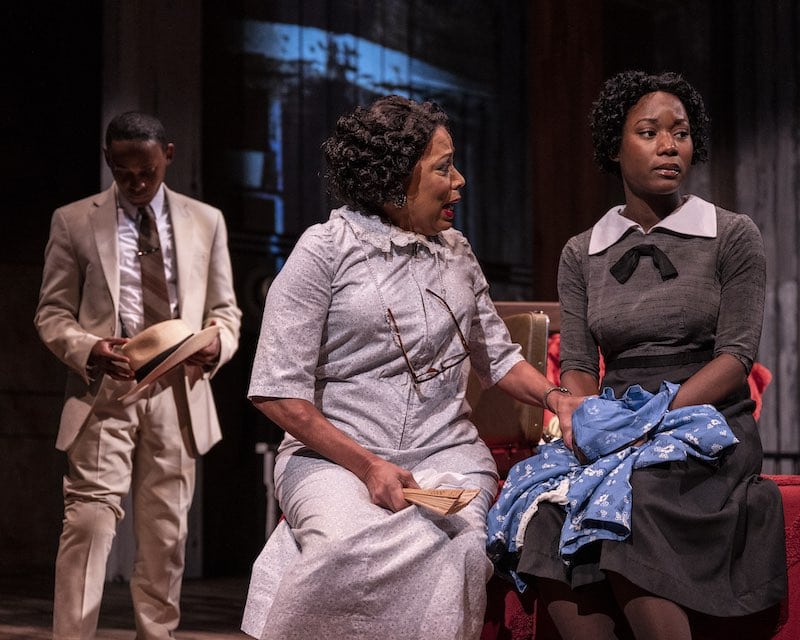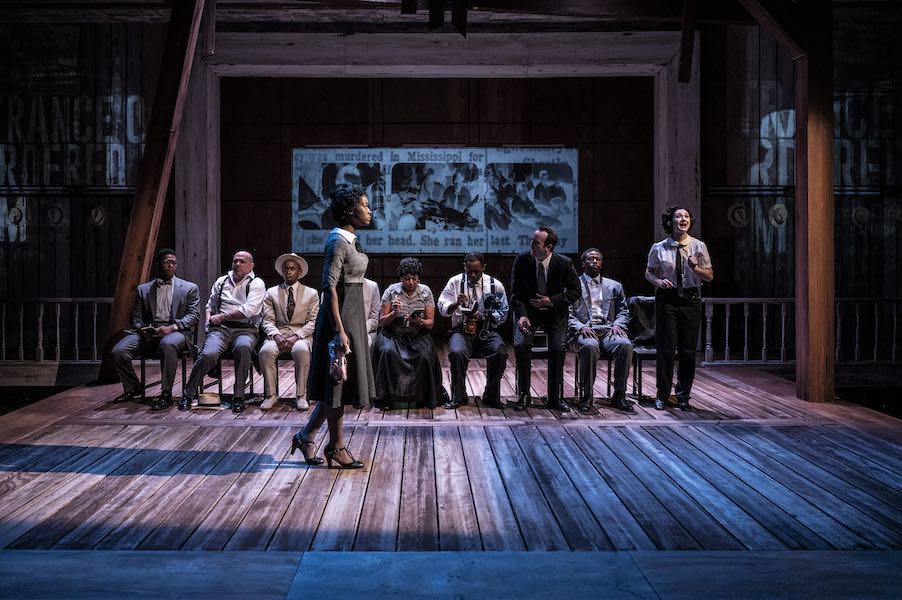“People in Tallachatchee County are to a great degree tired of Emmett Till… Somebody came down here and got into trouble. Overstepped his bounds to a degree some folks thought. And they cured him of his problems. Every day somebody’s dragging up the race card. Somebody’s saying we have racial disparity here. If nobody would stir the damn pile of stuff up, it wouldn’t stink.” — John Whitten, former county prosecutor
“Just like Mississippi there’s the white side of the story and there’s the Black side. And they don’t necessarily agree.” — Mississippi Congressman Benny Thompson (Chairman of the United States House Select Committee to Investigate the January 6th Attack on the United States Capitol)
(Source: All Things Considered, ‘Why Don’t Y’all Let That Die?’ Telling the Emmett Till Story in Mississippi)
In the Ballad of Emmett Till, the 14-year-old Emmett is the hyper-alive center and overwhelming presence of the play. In Benevolence, he is present as recent memory in the minds of people who were living in the area where the murder was committed. For these people, the memory of his murder and the culture that brought it about were literally in the water. These memories elicited terror in the Black population and a shameless recalcitrance in the white population.
That Summer in Sumner (now receiving its world premiere in Ifa Bayeza’s The Till Trilogy at Mosaic Theater) examines the events surrounding the trial seen through the eyes of Black reporters trying to get the facts of the story. It examines how both the reporters and the family of Emmett Till are stonewalled in their attempts to get the details of the story and in their attempts to get justice.

The trial of the white men who murdered and tortured Emmett Till was a circus. It was a farce. After being found not guilty, and knowing they could not be retried for the same crime, the perpetrators of the horror sold their story of how they did, in fact, abduct, torture, and murder Emmett Till to Look magazine for $4,000.
All three plays take place on a creaking wooden set, permeable by light and wind, that evokes the sense of living in a haunted house. Of the three plays, That Summer in Sumner takes the theme of haunting most literally. And the ghost that is doing the haunting in this play is the spirit of Emmett Till himself.
MAMIE: Oh Gene, I can hear him! I can hear him, chattering about the house, but I can’t, I can’t see him anymore. I had to identify. I had to identify every piece of him that was left. Now I have to look at his picture to hold him in my mind.
And it’s not just his mother who experiences this ghostly presence. Covering the story of the trial in Sumner, David Jackson (Jax), the photographer responsible for the famous, iconic picture that galvanized the Civil Rights Movement, also hears a man’s voice:
Git yourself to—Glendora. There yoah story. A place called King’s. Looking for a fellah name Too Tight … and a man named Hell. And don’t be there after dark.
When Jax turns to see who it is, no one is there. The audience, however, sees that it’s Emmett Till embodying an anonymous personage of the South. He will continue to appear as the embodiment of some operating principle or person of the South throughout this play,

I love a good courtroom drama, which is only one of the things that this play is. Weaving elements of this ghost story with courtroom drama and newspaper story from a woman’s point of view (in form, the play is like a mashup of the movies Topper, 12 Angry Men, and His Girl Friday), That Summer in Sumner asserts that in contrast to the worlds created in those movies that tell a mainstream narrative of the western world in which Black people are invisible, Black people do, in fact, exist, and far from being fodder for ridicule and entertainment, our lives matter. Well before the need for its reiteration in the 21st century after the murder of George Floyd, it is an unheralded Black press that we see at the center of this play whose task it is, in the 1960s, to bring this message to the world:
CLOYTE: We’re not coming down here just to “cover this story,” we’re coming to get justice!
In the 1960s, it was a rare Black household or barbershop that did not have copies of Ebony, Jet, or Negro Digest in it. The Black press corps in That Summer in Sumner shows us how these Black reporters were subject to the same forces that destroyed Till. We see how they needed both their own cleverness — and goodwill on the part of some of their white colleagues — in order to get the story and get out alive. The representatives from these three publications we see are Cloyte Murdock (Rolonda Watts), David Jackson/Jax (Vaughn Ryan Midder), Simeon Booker (Jaysen Wright), and their white photographer and reporter Mike Shea (Scott Ward Abernathy). Cloyte Murdock’s experience as the only female member of this team is informative. Rolonda Watts gives an incisive portrait of Murdock as feisty with her colleagues and adept at manipulating the misogyny and white supremacy that she must go through in order to do her job. In her scene with Mamie Till (Billie Krishawn), as two Black women who recognize their shared intersections of oppression and disrespect and who find ways to support each other, she says:
CLOYTE: I find it really calming, soothing, to attend to oneself once in a while. People think Johnson Publications is all John Johnson. Jet and Ebony, Negro Digest, skyscraper on Michigan Avenue! But Mrs. Johnson is a visionary, too. She’s got this whole new idea, a line of beauty products exclusively for Negro women. So your lipstick won’t turn purple. “It will keep your skin just as fair and flawless” … as it is now. Come on, sit.
The entire crew of reporters does excellent ensemble work displaying the by turns prickly and affectionate relationships of people who are not related to each other by blood but who nevertheless must depend on each other to survive.

That the trial was a circus that was insulting to Black folks and anyone who took even the potential of the idea of “all men are created equal” seriously is something that the playwright Ifa Bayeza gives startling and surrealistic expression to: She has a ghostly — and stuttering — Emmett Till fulfill his dream of becoming a stand-up comedian who, accompanied by a pre-recorded laugh track (Kwamina “Binnie” Biney), narrates his life to us onstage in the form of a sardonic “Emmett Till Show”:
BO: Old Thomas Jefferson was onto somethin’ man — and I don’t mean when he was doin’ his wife’s sister’s daughter — they they they got a lot of double fir-first-cousins, too — I mean that that that “pursuit of happiness.” That that that that that’s profound, you know … Imagine: everybody being entitled to havin’ a good time. Or tryin. Pursuin’ it. Mannn, that’s why I love me some jokes.
It’s a disturbing and effective moment performed with deep commitment by Antonio Michael Woodard.
The circus atmosphere is further enhanced by lights that frame the stage platform in a red glow at certain moments (lighting design by Alberto Segarra) and the way Director Talvin Wilks has the reporters pressed around the perimeter of that platform, for all intents and purposes becoming part of the theater audience.
Who gets to tell a story of an event that defines a people? Who gets to decide which parts of the story get told and which are buried and forgotten? Does a Black press exist anymore? Who cares for our stories? I read Jet magazine and Ebony all of my life, but I had never — not once — given a thought to the lives of the Black journalists who brought us these stories. That Summer in Sumner changed that.
Running Times:
The Ballad of Emmett Till – 90 minutes no intermission
That Summer in Sumner – 105 minutes, 15-minute intermission
Benevolence – 120 minutes, 15-minute intermission
That Summer in Sumner is part of The Till Trilogy, which plays in repertory through November 22, 2022 — on Wednesdays at 8 PM, Thursdays at 11 AM and 8 PM, Fridays at 8 PM, Saturdays at 3 PM and 8 PM, and Sundays at 3 PM — presented by Mosaic Theater Company performing in the Sprenger Theatre at Atlas Performing Arts Center, 1333 H Street NE, Washington, DC. For the schedule and to purchase tickets ($29–$64), go online or contact the Box Office at (202) 399-7993 or [email protected] from 11 AM – 5 PM Monday through Friday, or two hours prior to a performance.
The program for The Till Trilogy is online here.
COVID Safety: All patrons are required to be masked while inside performance spaces. The use of N95 masks is encouraged. Masks may be optional in other areas of the building, including lobbies. The complete Atlas Performing Arts Center COVID policy is here.
That Summer in Sumner
Written by Ifa Bayeza
Directed by Talvin Wilks
Cast
Antonio Michael Woodard: EMMETT “BO, BOBO” TILL, 14-year-old visitor from Chicago
Vaughn Ryan Midder: DAVID “JAX” JACKSON, (33) reporter and photographer for Jet Magazine
Billie Krishawn: MAMIE TILL-BRADLEY, (33) Emmett’s mother; RUBY HURLEY, (46) New Yorker-born Mississippi activist, field secretary for the NAACP; AMANDA BRADLEY, elderly sharecropper from Sunflower County, witness for prosecution
Scott Ward Abernethy: MIKE SHEA, photographer on the Jet/Ebony Magazine team; ROY BRYANT, (26) owner of Bryant’s Grocery & Meat Market; defendant; DEFENSE ATTORNEY SIDNEY CARLTON, a back-up lawyer for the defense; MR. MIMS, a witness
Christopher Genebach: SHERIFF STRIDER, oligarchic lawman of Tallahatchie County; J.W. “BIG” MILAM, (31) labor contractor and store owner from Glendora, Mississippi; defendant; DEFENSE ATTORNEY J. W. KELLUM, the second chair of five attorneys for the defense; CLARK PORTEOUS, reporter for the Memphis Press-Scimitar
Jason Bowen: MOSE WRIGHT, (64) Emmett’s great uncle; DR. TRM HOWARD, (47) a Mississippi Civil Rights Activist, scion of Black sanctuary Mound Bayou; CONGRESSMAN CHARLES DIGGS, (33) a freshman representative from Detroit
Rolonda Watts: CLOYTE MURDOCK, a fashion and lifestyle reporter for Ebony Magazine; ALMA “MAMOO” CARTHAN (53), Emmett’s grandmother ADLINE THOMAS, barmaid in Glendora, Mississippi; CHESTER MILLER, an undertaker and witness for the prosecution Jaysen Wright: SIMEON BOOKER, (37) ace investigative reporter of the all-Black Johnson Publications in Chicago; GENE MOBLEY, Mamie’s boyfriend; WILLIE REED, (18) surprise witness for the prosecution
Drew Kopas: SPECIAL PROSECUTOR ROBERT B. SMITH III, former FBI agent brought in by the governor; MONROE ST. JAMES, eccentric New York-based syndicated columnist
Anna DiGiovanni: CAROLINE BRYANT, (22) wife of Roy Bryant, witness for the defense; JJ BREELAND, (67) lead defense attorney; BOBBY HODGES, (18) fisherman and witness for the prosecution; DEPUTY SHERIFF COTHAM, chief law officer of Leflore County
Creative and Production
Scenic Designer: Andrew Cohen
Lighting Designer: Alberto Segarra
Projection Designer: Mona Kasra
Costume Designer: Danielle Preston
Sound Designer and Composer: Kwamina “Binnie” Biney
Associate Sound Designer: Dominique Perera
Vocal Arranger: Paige Rammelkamp
Additional Arrangements and Music Direction: Rickey Payton, Sr.
Properties Designer: Deb Thomas
Fight and Intimacy Director: Sierra Young
Dramaturg: Faedra Chatard Carpenter
Dialect Coach: Jen Rabbit Ring
Assistant Director and Choreographer: Sandra L. Holloway
Stage Manager: Shayna O’Neill
SEE ALSO:
‘The Till Trilogy’ at Mosaic Theater is beautiful, haunting, and horrifying (overview review of the trilogy by Gregory Ford, October 20, 2022)
‘Benevolence’ in Black and white at Mosaic Theater (review by Gregory Ford, November 1, 2022)
Brutality and transfiguration in ‘The Ballad of Emmett Till’ at Mosaic Theater
(review by Gregory Ford, November 3, 2022)




